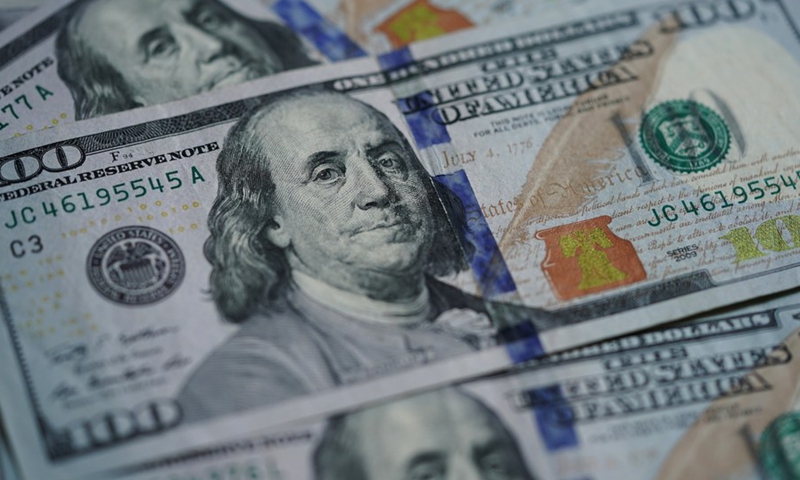
U.S. dollar banknotes (Photo: Xinhua)
The US Fed's latest rate hike to counter its high inflation may cast a shadow on the global economic recovery, experts said, but its impact on China's financial market and monetary policy will be limited, thanks to the latter's robust economic rebound after the COVID-19 epidemic and its ample liquidity.
The US Federal Reserve's policy committee on Wednesday lifted interest rates by one-quarter of a percentage point. It was the 10th hike of the current cycle, which came in just a little over a year.
The widely anticipated decision took the Fed funds target rate to a range of 5-5.25 percent, the highest since August 2007.
In the post-meeting press conference, Fed Chairman Jerome Powell said the bank was "getting close or maybe even there" when it came to pausing its rate hike cycle, according to US media reports, dropping a hint that the current hiking cycle may soon be paused.
"As we can see from recent US economic data, the country faces a dilemma featuring with a modestly growing economy and high inflation, which has not effectively eased," Chen Li, chief economist of Chuancai Securities, told the Global Times on Thursday.
US economic growth slowed to an annualized and seasonally adjusted rate of 1.1 percent in the first quarter of 2023, lower than the market expectation of 2 percent.
The Fed's meeting came amid banking turmoil in the US, and higher rates will exacerbate pressure on the banking system as they will push up interbank borrowing costs.
US regulators seized control of First Republic Bank and sold it to JPMorgan Chase on Monday. It became the third bank seized in just two months.
Considering that risks in the banking system have led to a further tightening of credit in the US, the Fed may enter a policy observation period, and the probability of suspending interest rate hikes is relatively high, Wu Chaoming, deputy head of the Chasing Research Institute, told the Global Times on Thursday.
"The US banking crisis is likely to be transmitted to the real economy, accelerating the tightening of financing through such channels as credit, bonds and stocks, and greatly increasing the risk of the US economy falling into recession," Wu said.
If the US chooses to continue lifting the rates, it will bring negative effect on global economy, he noted.
Zhou Maohua, an economist at Everbright Bank, warned that other economies should guard against the spillover effects of the US banking industry crises and high inflation.
"The Fed's latest rate hike will, however, have a limited impact on China's economy and financial environment, as the economy and policies of the two countries are now at different cycle phases," Zhou told the Global Times on Thursday.
China's economic rebound in the post-epidemic stage has been better than expected. It got off to a solid start as GDP grew by 4.5 percent year-on-year in the first quarter, with consumption contributing about two-thirds of economic output, official data showed.
In the short term, the US Fed's interest rate hike will enhance the attractiveness of the US dollar, and the yuan will be under pressure, but in the medium and long term, the strength of the yuan will be more closely related to the domestic economy, according to Chen.
As the Fed's interest rate hike cycle is expected to end, the downtrend of the US Dollar Index will be strengthened, and strong export prospects will support the fundamentals of the yuan. In that case, foreign capital is expected to return to the A-share market, according to a research note by Southern Asset Management.
In comparison with tightening credit in the US, domestic liquidity remains ample thanks to the China's sound and steady monetary policy, Chen said.




